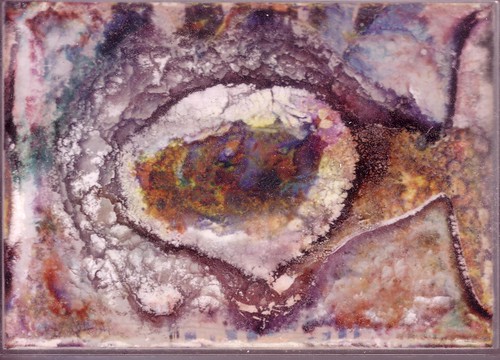But this cold will pass. The woodlice will come out of the walls again with the spring rain; the snails will sail slowly through the young weeds on the path. There will be warm, wet mornings dark with cloud, and I’ll be out with my plastic bag and a stick to get a free dinner of snails, the petit gris. I’ll put them to fast for nine days with a sprig of thyme, then clean them till they spit with vinegar and salt, boil them out of their shells and cut the shit off them, then do a cold garlic butter with parsley and eat them off the special plates that Margo bought in the market. I shall eat them by candlelight and pretend it’s a dinner party. [Derek Raymond, He Died With His Eyes Open, Chapter 17]
…I soon found number eighteen; it was the door that banged in the dark wind and had a pile of costermongers’ garbage three feet high beside it. The door banged because it didn’t lock, and it didn’t lock because the traders used the street-level passageway for parking their barrows and empty crates. I stood at the foot of the stairs in the gloom for a minute, then got my flashlight out—where would anybody be in modern London without one? I looked for a push button to light the cement stairs that yawned in front of me; there was one, but it didn’t work. On the inside of the street door was a wire basket full of mail. It looked like disagreeable mail, the kind that arrives in buff envelopes, and evidently nobody ever read it, because it looked as if it had been there a long time. [Chapter 20]
‘But you weren’t prepared to try the famous knack on anybody else, were you? No, because anyone with any balls would have told you to fuck off, and you’d have burst into tears, just like you’re about to do with me. You’re like a sinister little boy, Eric; every time the beastly horrid sand-castle falls in you burst out crying and try and kick someone smaller than you are. I bet you think of yourself as the detritus of your society—it’s a good excuse for a wallow in self-pity. But all you are, Eric, is just a wanker.’ [Chapter 20]
I’m still working my way through Derek Raymond’s He Died With His Eyes Open, but I had to post these three, coming so closely on top of one another (all three within 20 pages) as they did, and each one so perfect in its own way. I’d unexpectedly come upon this Derek Raymond book at a different branch library, so after the week before last’s pleasure at reading How The Dead Live, I couldn’t leave it be but had to borrow it.
Aux escargots! To the first passage we go. How do you tell a poor man? He’s someone who can’t afford a long word. Out of the 128 words I’ve quoted, there’s only two of three or more syllables: vinegar and candlelight. It’s not the book’s narrator who’s talking, it’s the victim, quoted speaking on an audio tape he left behind. A regular clue.
But the only clue you get out of this passage is how exquisitely close his life is to the bone of subsistence, and yet how much pleasure he derives out of the search for nourishment. Even though his life (as described earlier in the chapter) has been reduced to cycling through one punishing task after another in order to ward off complete destitution, he still envisions waiting more than a week to completely prepare for a nice dinner. It’s left for the reader to decide whether he would actually let the little gastropods alone for nine days, or just skewer and roast them that first spring evening.
The second quote is delivered by the book’s nameless protagonist, a police officer (naturally). Describing the desolation of a squat through the mail that it receives is a stroke of genius, and to me a peculiarly English one; I can’t imagine Bill Pronzini’s nameless San Francisco detective nailing the exact color of envelope that “disagreeable mail” comes in, but the descriptor evokes for me both the desperation of the departed tenants to whom the mail is addressed, as well as the liberation of the current crop of squatters living there, who pay no attention to the mail basket because their names aren’t known to creditors, yet.
And the third quote I tossed in because you’re like me, and you always wondered what exactly a “wanker” was. Now we know, right?
Retweet this!


